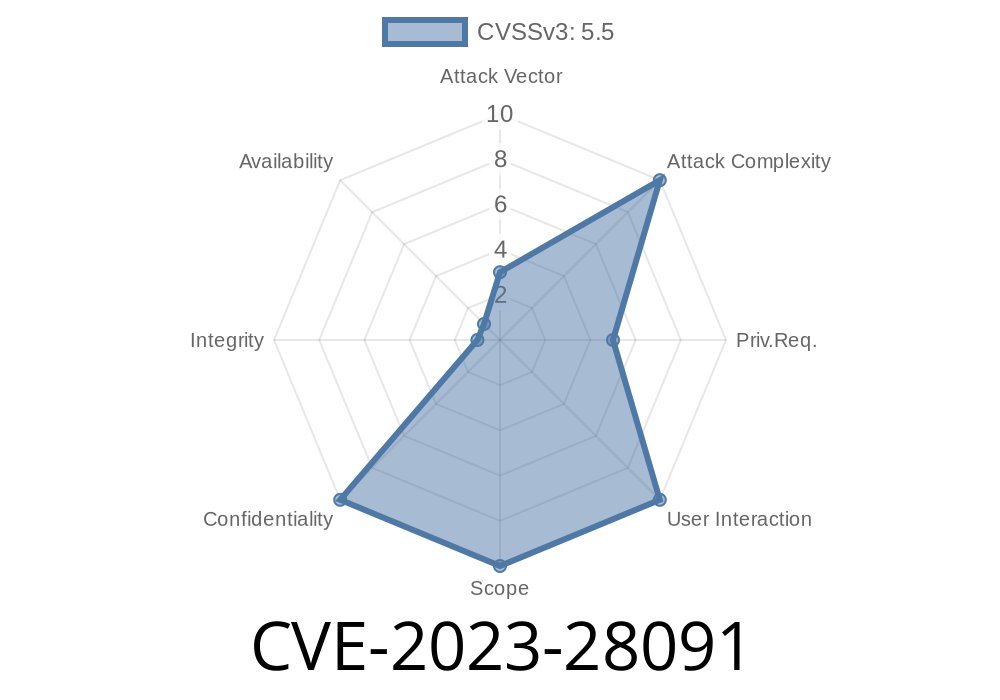In early 2023, Hewlett Packard Enterprise (HPE) disclosed a critical vulnerability affecting their OneView virtual appliance software. Known as CVE-2023-28091, this security flaw involves the "Migrate server hardware" feature, which—if used—can lead to sensitive information leaking into support dump files. In this detailed post, we'll explain the details of this CVE, how the vulnerability can be exploited, show a code snippet simulating the problem, and provide advice for securing HPE OneView deployments.
What is HPE OneView?
HPE OneView is a powerful IT management platform designed to simplify and automate data center operations. It's widely used for managing servers, storage, and networking hardware across enterprise environments.
The "Migrate server hardware" option in OneView is meant to help users move server hardware configurations between different appliance instances or clusters. This is typically a safe administrative operation, but the implementation in certain versions left a door open to unintended data exposure.
Summary of CVE-2023-28091
According to HPE's advisory, a user could potentially trigger information leakage under these scenarios:
Sensitive information that should not be present may appear in OneView support dump files,
- Anyone with access to these dumps could extract credentials, configuration details, or other sensitive artifacts.
What kind of data can leak?
Support dumps are intended for troubleshooting. Usually, they should not contain passwords, tokens, or detailed logs of containing configuration secrets. But during a migration, data such as:
How the Vulnerability Happens
The flaw boils down to improper data sanitization when generating support bundles. Here’s a simplified Python-style pseudocode example to show what goes wrong:
def generate_support_dump(server_hardware, all_configs):
bundle = {}
bundle['logs'] = collect_logs()
# OOPS: Exporting *all* configurations including secrets!
if server_hardware.migration_enabled:
bundle['hardware_details'] = all_configs # DANGEROUS: contains sensitive info!
else:
bundle['hardware_details'] = scrub(all_configs) # Should remove sensitive stuff
save_bundle(bundle)
What's the issue?
- If the migration_enabled flag is set because of a migration, the code skips scrubbing, so sensitive all_configs is dumped into the file.
Step-by-step walk-through
1. Attacker gains or is given support dump: This isn't always hard—tech support staff or malicious insiders often get access to these files.
Migration Occurs: Admins use the "Migrate server hardware" feature for legitimate reasons.
3. Support dump is created: During troubleshooting or routine backup, an administrator generates a OneView support bundle.
4. Review of support dump: The attacker (or even anyone inside support who shouldn't see those secrets) unzips the bundle and examines files like hardware_details.json or logs.
5. Extraction of secrets: Using simple grep or Python scripts, attacker pulls out sensitive config, user tokens, or network data.
Sample Bash command to look for credentials
grep -i "password" hardware_details.json
grep -i "token" hardware_details.json
Here’s a mock script showing how an attacker could pull secrets from a support dump
import json
def extract_secrets(filename):
with open(filename, 'r') as f:
data = json.load(f)
for key, value in data.items():
if 'password' in key.lower() or 'token' in key.lower():
print(f"Found secret: {key} = {value}")
extract_secrets('hardware_details.json')
Mitigation
HPE released patches and new versions that now sanitize sensitive details during support bundle generation, even after migrations.
What you should do
1. Update HPE OneView – See the official advisory for the right version for your appliance.
2. Regenerate Passwords – If you performed migrations and have shared support dumps, rotate affected passwords/tokens.
References
- HPE Security Bulletin hpesbgn04492en_us
- NVD Entry for CVE-2023-28091
Conclusion
CVE-2023-28091 is a textbook example of how mismanagement of support/diagnostic data can lead to significant security risks in enterprise environments. Admins are urged to update HPE OneView and handle support dump files as strictly confidential until patched. Even simple mistakes in data sanitization can expose an entire infrastructure to attack.
If you use HPE OneView, make sure you’re protected today!
Timeline
Published on: 04/14/2023 15:15:00 UTC
Last modified on: 04/21/2023 03:46:00 UTC
